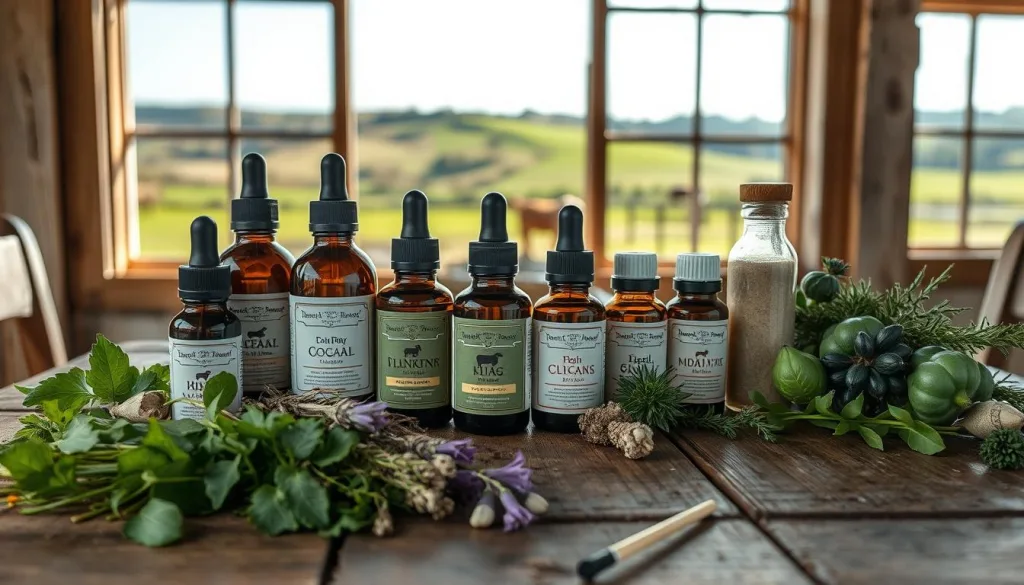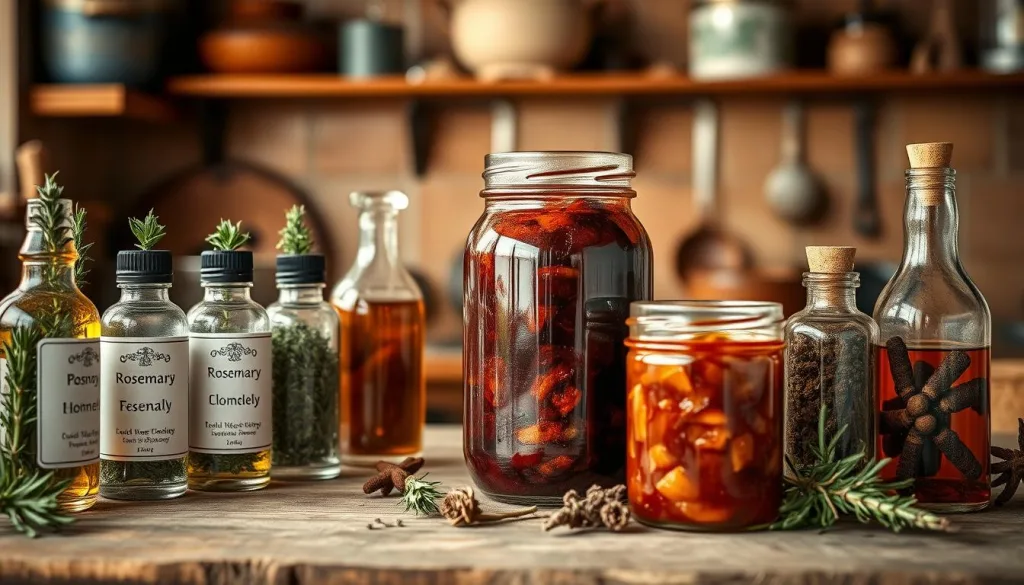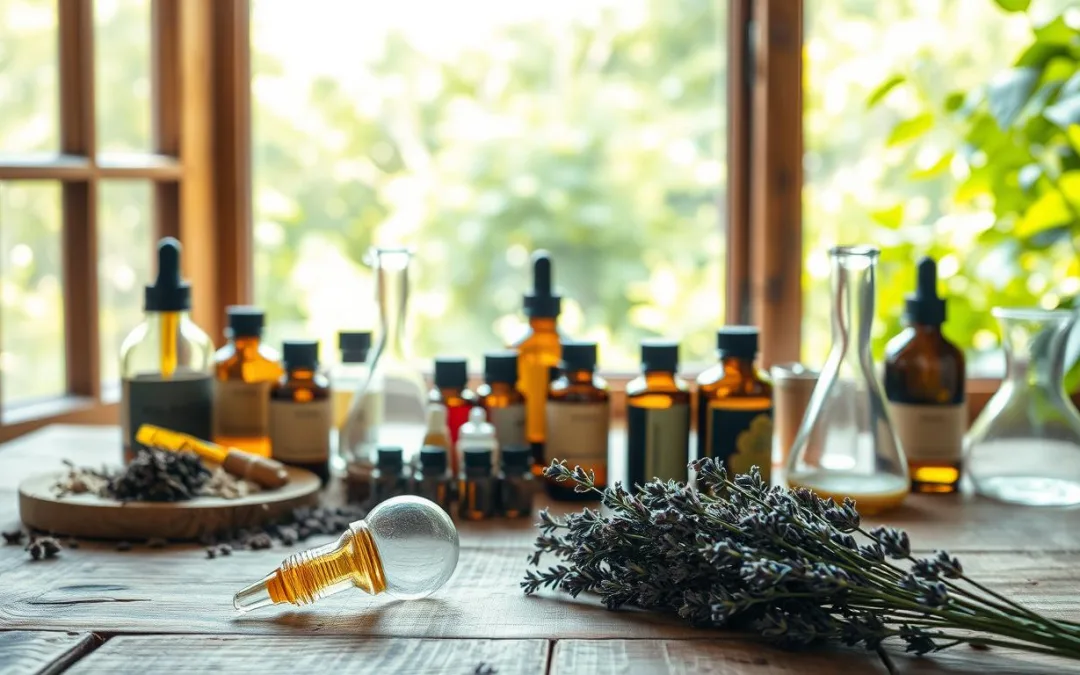Essential oils for homesteading open a world of natural wellness and sustainable living. These concentrated plant extracts have amazing antibacterial, antifungal, and antiviral properties. They can change how you manage health and your home.
Using essential oils for homesteading is more than a trend. It’s a smart way to live a more self-sufficient life. They offer natural cleaning solutions and medicinal uses. These plant extracts are powerful tools for those who want to avoid chemicals.
The process of making essential oils is fascinating. It takes a lot of plant material to get a small amount of oil. This shows how concentrated and valuable they are.
Key Takeaways
- Essential oils provide natural alternatives for health and home care
- Extraction methods require careful processing and significant plant material
- Proper dilution and usage are key for safe application
- Essential oils offer many benefits for homestead living
- Knowing about oil properties helps use them best
Understanding Essential Oils: A Foundation for Natural Living
Starting a journey with essential oils is a great step for homesteaders wanting natural solutions. These concentrated plant extracts are a powerful tool. They help in many areas of home and farm life.
Essential oils are volatile compounds taken directly from plants. They are the pure essence of plants. Unlike whole plants, these oils have concentrated compounds. They capture a plant’s most potent properties.
What Are Essential Oils?
Essential oils are highly concentrated plant extracts. They are the heart of natural living on a homestead. They have:
- Intense aromatic profiles
- Therapeutic properties
- Compact storage
- Versatile uses
The Science Behind Essential Oil Extraction
How oils are extracted affects their quality. Steam distillation is the main method. It needs a lot of plant material to get a little oil.
| Extraction Method | Plant Material Required | Oil Yield |
|---|---|---|
| Steam Distillation | Large Quantities | Small Volumes |
| Cold Pressing | Moderate Amounts | Medium Volumes |
| Solvent Extraction | Varied | Variable |
Quality Standards and Selection Criteria
Choosing high-quality essential oils is important. Look for:
- Pure, unadulterated sources
- Organic certification
- Third-party testing results
- Sustainable harvesting practices
Be careful: Some essential oils can be toxic, even in small amounts. You need to know how to handle them safely.
Knowing these basics helps homesteaders use essential oils safely and effectively. It’s a key part of natural living.
Essential Oils for Homesteading: Core Practices and Benefits
Adding essential oils to homesteading changes how you live sustainably. These natural extracts help solve daily problems. They are a key tool for homesteaders to manage rural life.
Essential oils are more than just scents. They are useful for health, cleaning, and taking care of the environment. They help in many ways on your homestead.
- Natural pest control strategies
- Holistic health support
- Cleaning and sanitization
- Livestock care
- Garden management
The way essential oils are made shows their strength. It takes about 1 ton of peppermint leaves to make just 1 gallon of peppermint oil. This shows how concentrated these plant extracts are.
| Essential Oil | Primary Homestead Use | Key Benefits |
|---|---|---|
| Lavender | Stress Reduction | Calming, skin healing |
| Peppermint | Pest Deterrent | Muscle relief, digestive support |
| Tea Tree | Antiseptic Cleaning | Antibacterial, antifungal |
| Eucalyptus | Respiratory Support | Muscle relief, infection prevention |
When using essential oils in homesteading, remember to dilute them right. Use 1-2 drops at a time. This keeps them safe and effective for your sustainable lifestyle.
Building Your Homestead Essential Oil Collection
Building a strong essential oil collection is key to homesteading success. These oils are more than just for scent. They’re tools for health, cleaning, and natural solutions. This guide will show you how to pick and keep your essential oils.
Must-Have Starter Oils
Start with oils that are good for many things:
- Lavender: It calms, heals skin, and keeps pests away
- Peppermint: It helps with digestion, cools, and keeps bugs off
- Tea Tree (Melaleuca): It fights germs and cleans well
- Lemon: It disinfects and lifts your mood
- Frankincense: It heals skin and balances emotions
Storage and Shelf Life
Keeping oils fresh is important. Here’s how:
| Oil Type | Estimated Shelf Life | Storage Recommendation |
|---|---|---|
| Citrus Oils | 1-2 years | Cool, dark place |
| Thick Oils (Patchouli, Sandalwood) | 4-8 years | Refrigerated |
| Most Essential Oils | 2-3 years | Sealed, away from direct sunlight |
Purchasing Guidelines
Choose quality oils over cheap ones. Look for:
- 100% pure, therapeutic-grade oils
- Clear information on where they come from
- Certifications from third-party testers
- Organic or wildcrafted options
With the right essential oils, you’ll have a valuable resource for your homestead.
Natural Cleaning Solutions for Your Homestead
Using essential oils for cleaning your homestead is a great alternative to harsh chemicals. These natural remedies are safe and effective for keeping your home clean and healthy.
Choosing natural cleaning solutions is more than a trend. It’s a key decision for your health. Research shows that regular cleaning products can harm your lungs, eyes, and skin. They might even mess with your hormones.
- Lemon essential oil: Powerful disinfectant with fresh scent
- Tea tree oil: Natural antimicrobial agent
- Peppermint oil: Kills bacteria and provides clean fragrance
Essential oils are amazing for cleaning. A basic cleaning mix usually has:
- 1 cup water
- 20 drops of selected essential oil
- White vinegar (optional)
Pro tip: Always dilute essential oils and test on small surfaces first. Making your own cleaners can save up to 90% of the cost. Plus, you avoid harmful chemicals.
Natural cleaning is not just about cleanliness—it’s about creating a healthier home environment.
By using these natural remedies, you’re making your home safer and more eco-friendly. It’s a big step towards better household cleaning.
Medicinal Applications in Homestead Healthcare
Homestead healthcare needs a holistic view. Knowing how to use essential oils is key for self-sufficiency and natural health. About 85% of homesteaders see the value of self-reliant health, making essential oils a great tool.
Using essential oils in homesteading opens up natural healing options. These plant extracts have strong medicinal powers. They can help with many health issues safely and well.
First Aid Applications
Essential oils are great for first aid on the homestead. They can be used for:
- Wound cleaning and antiseptic treatment
- Pain relief for minor injuries
- Reducing inflammation
- Supporting rapid healing
Common Ailment Remedies
Essential oils can treat many everyday health problems:
- Respiratory issues: Eucalyptus and tea tree oils for congestion
- Digestive discomfort: Peppermint oil for stomach upset
- Stress management: Lavender oil for relaxation
- Immune support: Oregano and thyme oils for boosting immunity
Safe Usage Guidelines
Using essential oils safely is important. Here are some guidelines:
- Always dilute essential oils with carrier oils
- Conduct patch tests before full application
- Consult healthcare professionals for specific medical conditions
- Store oils away from direct sunlight
- Keep essential oils out of children’s reach
Remember, 90% of successful herb users advocate thorough research to ensure safe and effective application.
By adding these natural remedies to your homestead healthcare, you’ll have a strong wellness plan. This plan will naturally help your family stay healthy.
Livestock and Animal Care with Essential Oils

Using essential oils for self-sustainable living is great for animal care on your homestead. These oils help more than just humans, they also improve animal health. Animal herbalism offers natural ways to keep your farm animals healthy.
Essential oils have special uses for different animals. Lavender oil is great for calming animals, reducing stress. Animals can absorb essential oils better because of their hair follicles.
- Thieves Essential Oil supports immune function across multiple species
- Cedarwood and Eucalyptus Blue help manage external parasites
- Coconut oil serves as an excellent carrier for essential oil treatments
Using essential oils safely is important. Not all essential oils are safe for every animal. Always get vet advice before using them.
- Dilute essential oils properly
- Start with minimal quantities
- Observe animal response carefully
- Monitor for any adverse reactions
Natural remedies complement, but do not replace, professional veterinary care.
For a complete approach to animal care, use essential oils wisely. Keep their living areas clean, feed them non-GMO food, and watch their health closely.
Garden and Pest Management Using Essential Oils
DIY essential oil recipes are great for keeping pests away from your garden. They offer a natural way to protect your plants. This method is good for the environment and your garden.
Essential oils do more than just keep pests away. They are a safe choice instead of using harmful chemicals. This helps keep your garden and the environment safe.
Natural Pest Control Solutions
Peppermint and rosemary essential oils are great for fighting pests. Studies show they work well against many pests:
- Peppermint oil keeps ants, aphids, beetles, and spiders away
- Cedarwood oil stops pests from moving
- Orange essential oil can kill all pests in an area
Plant Health Enhancement
Essential oils do more than just fight pests. They also help plants grow better. Using these oils carefully can make plants stronger and help them get more nutrients.
Soil Treatment Methods
Using essential oils in the right way can make your soil better. Mix 10-20 drops of essential oil with water and soap. This makes a spray that helps plants and keeps pests away.
Organic gardening takes time and effort. It usually takes about three years to get your soil healthy.
Adding essential oils to your gardening can make your garden better. It creates a safe place for plants to grow and keeps pests away naturally.
Food Preservation and Storage Enhancement

Using essential oils in homesteading is a smart way to keep food fresh longer. These natural extracts help keep your homegrown food safe and tasty for longer.
Essential oils have special powers that fight off harmful microbes. This knowledge helps homesteaders keep their food fresh and safe.
- Basil essential oil offers antibacterial protection
- Rosemary extract provides antioxidant benefits
- Thyme oil contains powerful antimicrobial compounds
When you use essential oils to preserve food, it’s important to follow safety rules. Not all essential oils are safe for food, and you must dilute them correctly. Choose high-quality, food-safe essential oils for cooking.
| Essential Oil | Preservation Benefit | Recommended Dilution |
|---|---|---|
| Thyme | Antibacterial protection | 0.1-0.5% |
| Rosemary | Antioxidant preservation | 0.2-0.4% |
| Peppermint | Inhibits microbial growth | 0.1-0.3% |
Each food preservation method needs a special approach with essential oils. Methods like drying, fermenting, and canning can all benefit. Always check food safety rules and tested recipes for the best results.
Knowing how to use essential oils correctly turns them into powerful tools for preserving food on your homestead.
Conclusion
Essential oils are a game-changer for homesteading. They offer a way to live more sustainably. Using essential oils in homesteading lets us live holistically, making our daily lives better with natural solutions.
Using essential oils is more than just a practical move. It’s about connecting with nature’s power. These oils can change how we live off the land, from fighting pests to caring for ourselves.
Learning is key to using essential oils right. They’re powerful, but we must use them wisely. By learning and using them carefully, we can live healthier and more sustainably.
Your journey with essential oils is ongoing. Keep learning, try new things, and stay curious. Natural living is full of possibilities, waiting for those who are ready to explore.
FAQ
Are essential oils safe to use on my homestead?
How do I choose high-quality essential oils?
Can I use essential oils for pest control on my homestead?
How should I store my essential oils?
Are essential oils safe for use around livestock?
Can I make my own cleaning products with essential oils?
How do I use essential oils for first aid on my homestead?
What are the best essential oils for a homesteading beginner?
Source Links
- How To Make Essential Oils At Home | Homesteading Skills – https://homesteading.com/how-to-make-essential-oils/
- Safety of Essential Oils – What You Need to Know – https://melissaknorris.com/the-truth-about-essential-oils-and-how-to-stay-safe/
- 7 Holiday Essential Oil Blends for a Natural Homestead – https://melissaknorris.com/7-holiday-essential-oil-blends-for-a-natural-homestead/
- Herbs vs. Essential Oils: Thoughts from an Herbalist and Aromatherapist — All Posts Healing Harvest Homestead – https://healingharvesthomestead.com/home/2018/8/17/herbs-vs-essential-oils-which-are-best
- Episode 204: The Homesteading Lifestyle | doTERRA Essential Oils – https://www.doterra.com/US/en/podcast-episode-204-the-homesteading-lifestyle
- Essential Homestead Skills – https://melissaknorris.com/8-essential-skills-for-the-modern-homesteader/
- Getting Started with Essential Oils – CITY GIRL FARMING | Sustainable Living for Regular People – https://citygirlfarming.com/getting-started-essential-oils/
- Homemade Protective Essential Oil Blend • The Prairie Homestead – https://www.theprairiehomestead.com/2013/01/diy-thieves-oil-recipe.html
- Essential Oils Aromatherapy Guide for Beginners to Start Safely – https://naturallivingfamily.com/essential-oils/getting-started/aromatherapy-guide/
- Essential Oils on the Homestead – Modern Homesteading | Stylish Self-Sufficient Living | Homesteading | City to Country | City and Country Life | Homesteading Blog | Moving to the Country Blog | How to Homestead – https://modernhomesteading.ca/blog/essential-oils-on-the-homestead
- 30 Essential Oil Hacks for Homesteading • The Prairie Homestead – https://www.theprairiehomestead.com/2016/05/essential-oils-homesteading.html
- Homesteading Wherever You Are | doTERRA Essential Oils – https://www.doterra.com/US/en/podcast-episode-61-homesteading-wherever-you-are
- Non-Toxic Cleaning 101: Ditching Harsh Chemicals Step-by-Step – https://thehomesteadchallenge.com/all-natural-cleaning-supplies/
- Homemade Cleaning Products – Wilson Homestead – https://wilsonhomestead.com/homemade-cleaning-products/
- How To Start a Medicinal Herb Garden – Homesteaders of America – https://homesteadersofamerica.com/start-medicinal-herb-garden/
- Medicinal Herbs & Their Uses – https://homesteadingfamily.com/medicinal-herbs-their-uses/
- Homestead Health – https://www.nourishingdays.com/homestead-health/
- How To Use Natural Remedies For Your Livestock – https://homesteadhow-to.com/how-to-use-natural-remedies-for-your-livestock/
- How to Prep for Pet and Livestock Emergencies – The Basics – Modern Homesteading | Stylish Self-Sufficient Living | Homesteading | City to Country | City and Country Life | Homesteading Blog | Moving to the Country Blog | How to Homestead – https://modernhomesteading.ca/blog/how-to-prep-for-pet-and-livestock-emergencies
- In the Garden: Non-Toxic Pest Control with Essential Oils – CITY GIRL FARMING | Sustainable Living for Regular People – https://citygirlfarming.com/2017/05/12/non-toxic-pest-control-essential-oils/
- Organic Garden Pest Control – https://rootsandrefuge.com/organic-garden-pest-control/
- 5 Must Have Essential Oils for Your Garden – https://www.thenaturelifeproject.com/essential-oils/
- Beginner’s Guide to Food Preserving + Storage – https://growinghome.com.au/dirt-to-dinner-guides/food-preserving-storage/
- How to Dry and Preserve Herbs: A Comprehensive Guide – https://gubbahomestead.com/food-preservation/how-to-dry-and-preserve-herbs-a-comprehensive-guide/
- All Natural Wool Dryer Balls and Essential Oils – https://thefewellhomestead.com/wool-dryer-balls-essential-oils/


